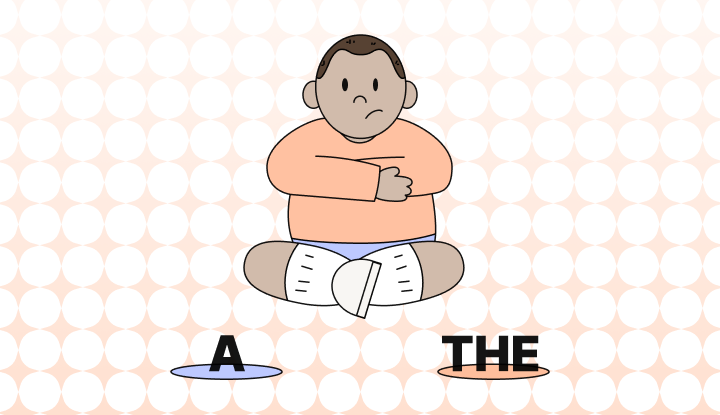英語を母国語としていない人が最もよくする英文法の誤りは、「a、an、the」といった冠詞を間違って使うことです。 冠詞と関連した誤りは、大きく分けて冠詞の抜け、冠詞の誤った使用、不要な冠詞付けに区分できます。 この中で最も一般的な誤りは、冠詞が抜けている誤りです。 英語学習者の英文法の誤りに関する研究によると、冠詞が抜けている誤りが全体の66%に至るとも報告されています。冠詞の誤が頻繫に起きる理由は、英語学習者の母国語、特に日本語に冠詞という概念がいないためでしょう。
以下の文章は、英語を母国語としていない人が頻繫に間違える例です。
- My brother is football player. → My brother is a football player.
この文章は、冠詞が抜けている例文です。一般的に名詞が単数名詞、または数えられる名詞(加算名詞)、そして固有名詞ではない場合は、形容詞が名詞の前に位置しても必ず冠詞が必要です。上記の例では、footballがplayerを修飾する形容詞であり、playerは上記の3つの条件をすべて充足しているため冠詞が付くのです。
- A cats are great pets. → Cats are great pets.
上記の例文は、catsが複数名詞にもかかわらず、単数名詞の前に使う「a」を付けました。したがって、上記の文章で冠詞「a」は文法誤りです。複数名詞であるcatsの前には冠詞を付けないのが正しい英文法です。
以下は、名詞の前に冠詞が必要かどうかについてまとめた表です。
| 加算名詞 | 不加算名詞 | |
|---|---|---|
| 単数名詞 | a, an または theが必要 | 冠詞省略、または the |
| 複数名詞 | 冠詞省略、または the (a/anを付けない) | 冠詞省略、または the |
- I cracked a egg into the bowl. → I cracked an egg into the bowl.
上記の文章は、冠詞の間違った使用を表しています。名詞の発音が母音で始まる場合は、「a」の代わりに「an」を付けないといけません 。
- He handed in a homework that was due last Tuesday late. → He handed in the homework that was due last Tuesday late.
上記の例文の「He」は、特定の宿題、つまり先週の火曜日まで提出するべきだった宿題を遅く提出したとの意味で使われました。 したがって、homeworkの前には、「a」の代わりに「the」を付けないといけません。
以下は、冠詞の間違った使用に関する追加例文です。
- I commute to office by bus. → I commute to the office by bus.
- She takes freeway to work every day. → She takes the freeway to work every day.
- Please send email to your manager. → Please send an/the email to your manager.
- Don’t pick up phone. → Don’t pick up the phone.
- He bought birthday cake for his daughter. → He bought a birthday cake for his daughter.
冠詞の使い方は、母国語が英語ではない人、特に日本人が最も苦手とする文法要素です。 冠詞についていくら勉強してもよくわからない時には、英語文法チェッカーの「Engram」を使ってみてください。 「Engram」は、以下のリンクから利用することができます。

参考資料:















